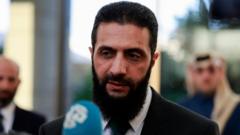In a recent interview with Saudi state broadcaster Al Arabiya, Ahmed al-Sharaa, the leader of the rebel group Hayat Tahrir al-Sham (HTS), projected that Syria may require up to four years to hold new elections. This statement marks the first time Sharaa has provided a timeline since his group spearheaded an offensive to oust former President Bashar al-Assad. Sharaa emphasized that the drafting of a new constitution could take approximately three years, and even a year may be needed before Syrians witness substantial improvements in public services following the fall of the Assad regime.
The path to legitimate elections, according to Sharaa, necessitates rebuilding Syria's legal framework and conducting a comprehensive population census. Known previously as Abu Mohammed al-Jolani, Sharaa has taken a leadership role in the new authorities emerging from Assad's ouster. Amid concerns about how HTS will govern Syria’s diverse population, Sharaa asserted that the organization—which initially adopted violent jihadist tactics but has since distanced itself from that identity—would be “dissolved” during an upcoming national dialogue conference.
This dialogue represents a critical opportunity for Syria's emerging leadership, as it attempts to foster unity in a nation fractured by thirteen years of civil conflict. Responding to critiques of his transitional government, Sharaa defended the essential nature of recent appointments, aimed at inclusivity rather than exclusivity.
Syria's demographic landscape consists of numerous ethnic and religious communities, including Kurds, Armenians, Assyrians, Christians, Druze, Alawite Shia, and Arab Sunnis, the latter being the predominant Muslim group. Sharaa reassured that the rights and freedoms of the nation's minorities would be safeguarded.
In a related development, a crackdown on Assad loyalists has led to the arrest of nearly 300 individuals over the past week, as reported by the Syrian Observatory for Human Rights. The detained include informants, pro-regime fighters, and former soldiers, with reports suggesting these operations were conducted with local community cooperation.





















